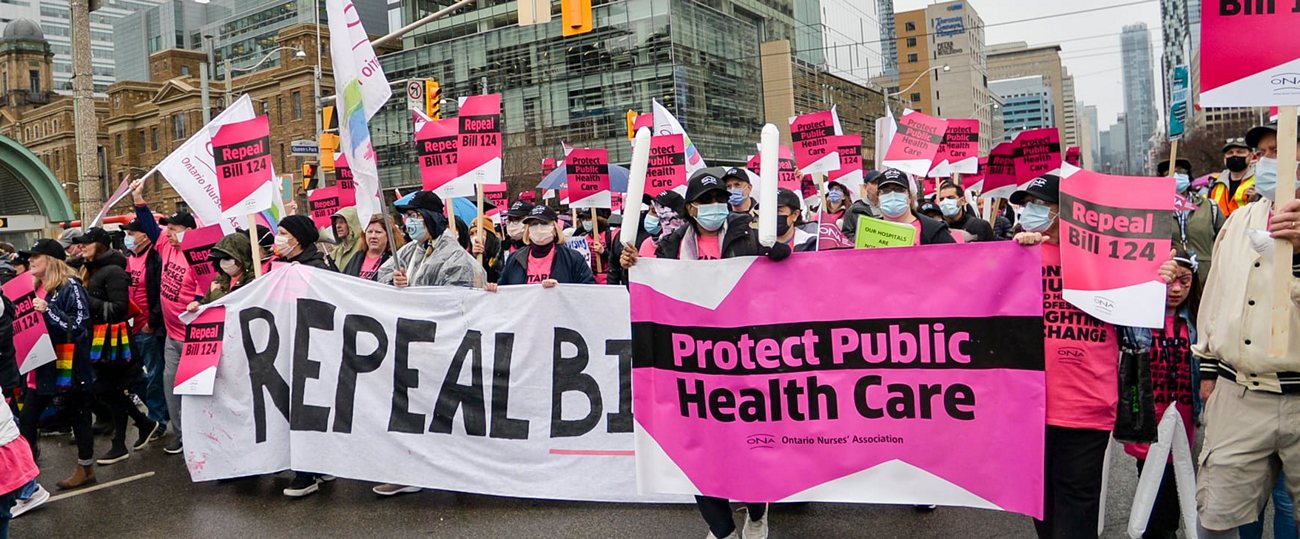In the News June 20
Privatization of Health Care
The Harm Caused by Use of “Agency Nurses”

Ontario nurses put forward their demands at May Day 2022 action in Toronto.
The Toronto Star, on June 15, published an article by freelance contributor Armine Yalnizyan based on an interview with an agency nurse in Ontario who had, until last year, been employed in the public health care system. Agency nurses are employed by private agencies who provide staff to the public health care system to cover for staff shortages. The nurse who was interviewed was definitive in her assessment that agency nursing is “bad for the community and bad for patient care because there is no consistency, it fragments health delivery.”
Agency nurses are assigned to different health care settings for short periods. Agency nurses who fill in to cover staff shortages do not have the connection to the rest of the health care team and come in blind to patients’ history prior to their arrival.
Over the past two years some provincial governments invoked their emergency powers to deal with COVID-19 by violating contracts and forcing health care workers to work overtime, imposed changes in shifts and schedules and work assignments and denied leaves including vacations. Ontario, which has for many years had the lowest nurse to patient ratio in the country, overrode the collective agreements of nurses and other health care workers, making working conditions, which were already difficult, untenable for many.
The nurse that was interviewed does exactly the same work now as an agency nurse as she did when she was employed by the public health care system. She left her job in the public system because she could no longer endure the situation where she had to work mandatory overtime, repeatedly lost planned vacations, and was burned out from having to work short-staffed all the time. As an agency nurse she is offered assignments which she can accept or turn down, earns a higher wage than when she worked for the public sector, gets paid double time on both days of the weekend instead of only one day, and is paid her travel time. In one case in Toronto 21 nurses quit, went to work for agencies, who then sent them back to the same Intensive Care Unit at double their salaries.
The Star reports “Agency nursing has become a ticking time bomb for our system of public health care, and for the amount and quality of care we will all be able to access.”
Linda Silas, President of the Canadian Federation of Nurses Unions (CFNU), commenting on the use of agency nurses in hospitals and long-term care, pointed out to the reporter that the fees paid to the agencies who supply the nurses who work in the public health care system come from the public purse. In some cases private long-term care facilities bring in agency nurses and in most provinces those private long-term homes are also funded from the public purse. She said that in terms of the nursing shortage, “The patchwork solution is agency nursing. The long-term solution is agency nursing. Nobody is thinking about sustainability. There’s no light at the end of the tunnel.”
Armine Yalnizyan comments, “the irony is if any government spent just a fraction of what they’re spending on agencies to improve wages and working conditions, they’d solve the problem [of staff shortages].”
The Canada Health Act requires that provinces and territories “must ensure all medically necessary services provided by hospitals, medical practitioners and dentists working within a hospital setting … be administered and operated on a non-profit basis by a public authority accountable to the provincial or territorial government.” Governments have systematically handed over one after another part of the health care system to private interests from international monopolies to local agencies. Nominally there is administration and operation of health care by a “public authority” but so much of the work in health care has been subcontracted that whatever public authority exists is crippled and has been rendered impotent.
The Star report concludes that patients need more and consistent care and workers need respect, and a long-term plan that is national in strategy and scope is needed to achieve that: “We did it before, when we created Medicare in 1966. Surely, with our economy 42 times bigger than it was 56 years ago, we can come up with a plan that sustains Medicare now.”
There is no doubt that a change in direction of the health care system is needed and on the current path “there is no light at the end of the tunnel.” There is also no doubt that those who profit from the privatization of health care and their representatives in government will not be the ones to bring about such change because they follow the neo-liberal path of “solving problems” by handing over everything, including the social programs for which governments are responsible, to private enterprise, along with massive funding from the public purse with little to no oversight.
Privatization blocks the working people from having any say in matters that are important to them in their work and to society which depends on them. Nurses and other frontline health care workers continue to fight for an end to government cuts and restructuring, an end to privatization and for the implementation of solutions that favour the people.
Workers’ Forum, posted June 20, 2022.

|

|

